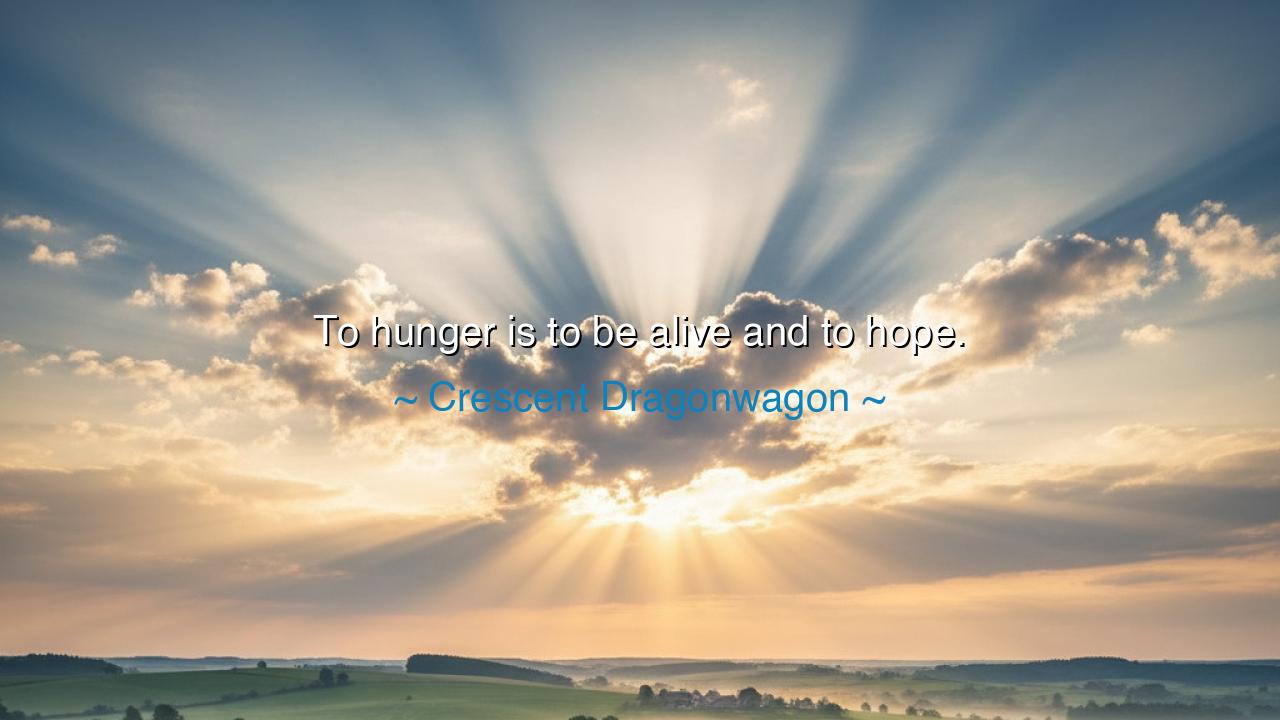
To hunger is to be alive and to hope.






“To hunger is to be alive and to hope.” — Crescent Dragonwagon
In the quiet dawn of existence, the ancients understood that hunger was not merely a call of the body but a song of the spirit. To hunger was to yearn, to reach beyond the edge of what is known, to stretch one’s hand toward the distant flame of possibility. Hunger, in this sacred sense, is the pulse that keeps the soul awake. It whispers to us that we are not yet finished, not yet fulfilled, not yet still. The one who hungers still believes that there is more — more to see, to learn, to love, to become. Thus, to hunger is to be alive, for only the living feel the ache of desire, and only those who still dream feel the warmth of hope.
There was once a wanderer in the desert who, after many days without food, found himself on the verge of collapse. Yet as he looked to the horizon and saw the faint shimmer of an oasis, his body stirred again. The vision — whether real or imagined — breathed strength into his failing limbs. His hunger became his salvation, for it kept his heart beating and his feet moving. So it is with the human spirit: our hunger keeps us alive, not merely in flesh, but in meaning. Without it, we would wither not from the lack of sustenance, but from the absence of purpose.
In the story of humankind, this truth echoes again and again. Consider Nelson Mandela, imprisoned for twenty-seven years. In the cold stone silence of his cell, he could have surrendered to despair. Yet he hungered — not for food, but for freedom, for dignity, for the awakening of his people. That hunger was his heartbeat through every year of darkness. It was his hope that nourished him more than bread, and when at last the walls opened, the same hunger became the fire that transformed a nation. From his life we learn that the greatest hunger is not of the stomach but of the soul.
Those who cease to hunger, who dwell only in comfort and complacency, are like a flame deprived of air. Their light dulls, their spirit dims. The ancients would say that the gods do not favor those who are already content, for contentment without striving is a kind of slumber. The divine spark within each being yearns to grow, to stretch, to evolve. Thus, to hunger is to honor the divine call — to remain restless, to keep reaching for a greater truth. Even in pain, there is holiness, for it is the mark of one still moving toward the light.
Yet hunger must not be confused with despair. Despair is the end of longing; it is when hunger dies and hope turns to dust. But to hunger and still hope — that is the dance of life itself. The seed buried in the earth hungers for the sun and believes it will break through. The sailor lost at sea hungers for land and steers his vessel toward it, though the stars hide their faces. Hope gives hunger its direction, and hunger gives hope its power. Together they forge the will to live, to love, and to create.
Let us then honor our hungers — for knowledge, for kindness, for change, for the sacred beauty of becoming. When the heart aches for something greater, it is not weakness but awakening. Do not curse your hunger; nurture it, for it is your compass. Feed it with purpose, with learning, with acts of courage and compassion. For each step taken in the name of longing draws you closer to the divine fullness that life promises.
Lesson:
To hunger is not to suffer — it is to be awake. Those who feel the pangs of desire for betterment, justice, or love are the torchbearers of human progress. Guard your hunger; let it not fade beneath comfort or fear. Each day, ask yourself: What do I still hunger for? Then rise and walk toward it. For as long as you hunger — for truth, for beauty, for goodness — you are still alive, and where there is life, there will always be hope.






AAdministratorAdministrator
Welcome, honored guests. Please leave a comment, we will respond soon